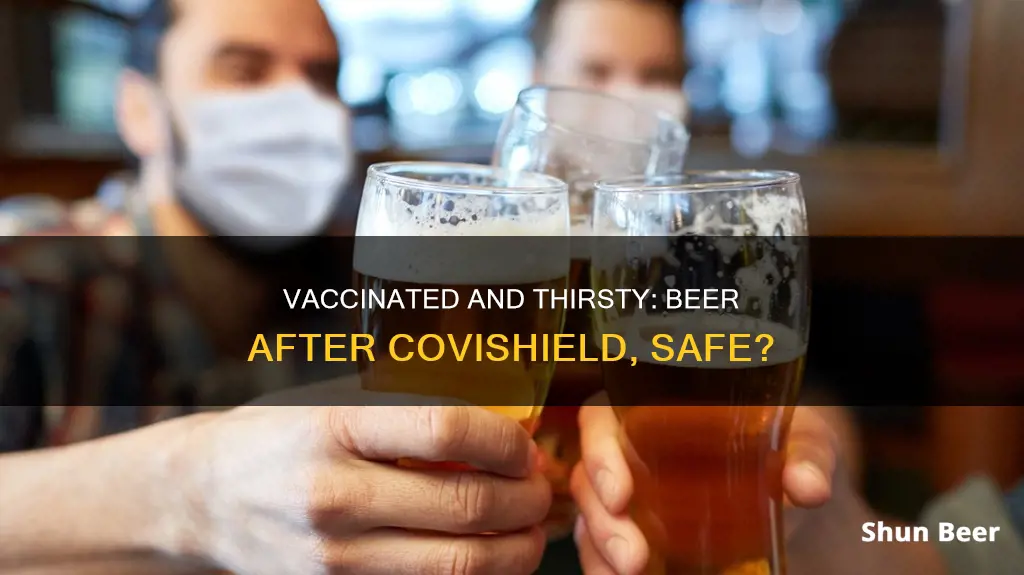
There is no conclusive evidence that drinking alcohol after receiving the COVID-19 vaccine reduces its effectiveness. However, there is research to suggest that alcohol consumption can affect the immune system and may increase the risk of adverse side effects from the vaccine. As such, some experts advise against drinking alcohol immediately after vaccination, especially heavy drinking.
Can I drink beer after the Covishield vaccine?
| Characteristics | Values |
|---|---|
| Is there official guidance on drinking alcohol after the Covishield vaccine? | No |
| Is there any evidence that alcohol affects the efficacy of the vaccine? | No |
| Do experts advise drinking alcohol after the vaccine? | Some experts advise against drinking alcohol after the vaccine, especially heavy drinking. |
| Is there any evidence that drinking alcohol affects the immune response to the vaccine? | Yes, heavy drinking may negatively impact the immune response to the vaccine. |
| Is it safe to drink alcohol before the vaccine? | There is no official guidance on this, but some sources advise against it. |
What You'll Learn
- There is no conclusive evidence that alcohol reduces the vaccine's effectiveness
- Experts advise against heavy drinking immediately after receiving the vaccine
- Alcohol may worsen the side effects of the vaccine
- Light or moderate drinking is unlikely to impair the immune response to the vaccine
- Heavy drinking may negatively impact your immune system

There is no conclusive evidence that alcohol reduces the vaccine's effectiveness
While there is no conclusive evidence that alcohol reduces the COVID-19 vaccine's effectiveness, there are some conflicting opinions and ongoing research on the topic.
Some experts advise against drinking alcohol after receiving the COVID-19 vaccine, especially heavy drinking, to allow the body time to recover. Alcohol can cause side effects such as fatigue, headache, and nausea, which may be mistaken for or worsen the side effects of the vaccine. However, it is important to note that there are no official guidelines or conclusive evidence to support this advice.
Research has shown that chronic, heavy alcohol use can impact the immune system and lower immunity. A 2021 study found that binge drinking increases gut permeability, allowing toxins, bacteria, and other foreign substances to leak through the gut wall, leading to a state of chronic inflammation. Additionally, a 2022 study found that binge drinkers had increased levels of pro-inflammatory compounds in their circulation. These effects of alcohol on the immune system could potentially influence the body's response to the vaccine.
On the other hand, some studies suggest that moderate drinking may have less impact on the immune system. A 2020 study published in the journal Alcohol and Alcoholism found that a moderate dose of alcohol did not significantly alter the immune systems of healthy non-chronic-drinking adults. Another review published in 2016 supported this, noting that light-to-moderate drinking may even improve the response to vaccination.
While there is no conclusive evidence that alcohol reduces the COVID-19 vaccine's effectiveness, it is important to note that excessive alcohol consumption is associated with negative health consequences and can impact the immune system. Therefore, it is always advisable to drink in moderation.
Beer and Breastfeeding: What's Safe?
You may want to see also

Experts advise against heavy drinking immediately after receiving the vaccine
Some experts recommend avoiding alcohol for a few days after receiving the COVID-19 vaccine, as hangover symptoms such as fatigue, headache, and nausea may mimic or worsen the side effects of the vaccine. While there are no official guidelines, it is generally advised to abstain from or reduce alcohol intake for 48 to 72 hours after vaccination to allow the body to recover and adjust to the vaccine.
Chronic, heavy alcohol use can impact the immune system and lower immunity. Binge drinking, even in otherwise healthy individuals, can hinder the immune system and increase gut permeability, leading to a state of chronic inflammation. However, moderate drinking is not expected to significantly affect the immune response to the vaccine.
It is important to note that alcohol can have adverse effects when combined with certain medications, such as fever reducers and Tylenol, which may cause bleeding, rapid heartbeat, ulcers, upset stomach, and liver damage. Therefore, it is crucial to consult with a healthcare professional if you have any concerns or questions about consuming alcohol after receiving the COVID-19 vaccine.
The Science Behind Beer Blizzard
You may want to see also

Alcohol may worsen the side effects of the vaccine
While there is no official guidance on drinking alcohol after receiving the COVID-19 vaccine, some experts advise against drinking—especially heavy drinking—immediately after vaccination. This is because alcohol may worsen the side effects of the vaccine.
Drinking alcohol may cause fatigue, headache, and nausea, which are also potential side effects of the COVID-19 vaccine. If you drink alcohol after getting the vaccine, you may mistake these hangover symptoms for side effects of the vaccine, or vice versa. This could lead to people reporting these symptoms as side effects of the vaccine, potentially putting others off from getting vaccinated.
In addition, excessive alcohol consumption can suppress the immune system and increase the risk of sickness. This is because alcohol can decrease the levels of crucial substances that help immune cells travel to sites of infection, leading to a weakened immune response. As a result, the vaccine may not work as effectively as it normally would.
According to the Centers for Disease Control and Prevention (CDC), moderate alcohol consumption is defined as one drink or less per day for women and two drinks per day or less for men. Heavy drinking is defined as more than seven drinks per week for women and more than 14 drinks per week for men.
If you do choose to drink alcohol after receiving the COVID-19 vaccine, it is best to drink in moderation and avoid heavy or binge drinking, especially during the first two weeks after vaccination. This will help to maintain your immune system and ensure the vaccine can work as effectively as possible.
How Non-Alcoholic Beer Can Help Curb Alcohol Cravings
You may want to see also

Light or moderate drinking is unlikely to impair the immune response to the vaccine
While there is no official recommendation to avoid drinking alcohol after receiving a COVID-19 vaccine, some experts advise against drinking right after vaccination. This is because hangover symptoms like fatigue, headache, and nausea may mimic or worsen the side effects of the vaccine.
However, light or moderate drinking is unlikely to impair the immune response to the vaccine. A review published in 2016 noted that light-to-moderate drinking may improve the response to vaccination. Light drinking is defined as 12 drinks or fewer in a year, with a maximum of three drinks per week. Moderate drinking is defined as more than three but no more than seven drinks per week for women and more than three but no more than 14 drinks per week for men.
In contrast, chronic heavy drinking has been shown to increase the risk of bacterial and viral infections. Heavy drinking is defined as more than seven drinks per week for women and more than 14 drinks per week for men. Excessive alcohol consumption can impair the body's ability to defend itself against infection and can lead to several health conditions, including acute respiratory stress syndrome (wet lung).
While there is no conclusive evidence that alcohol reduces the vaccine's effectiveness, some studies suggest that alcohol may activate ACE2 receptors, which are also the receptors for the COVID-19 virus. Additionally, chronic alcohol consumption may exacerbate heart problems after receiving an mRNA COVID-19 vaccine.
Therefore, while light or moderate drinking is unlikely to impair the immune response to the vaccine, it is important to drink in moderation and be aware of the potential risks associated with excessive alcohol consumption.
Andre's Beer Challenge: How Many Can He Handle?
You may want to see also

Heavy drinking may negatively impact your immune system
There is no official advice or guideline to avoid drinking alcohol after receiving the COVID-19 vaccine, including the Covishield vaccine. However, heavy drinking may negatively impact your immune system.
Heavy drinking lowers immunity by impairing your body's normal defences. It can damage the bone marrow, where white blood cells are produced, leading to a low white blood cell count and making it more difficult for your body to fight off infections. Alcohol also damages the white blood cells themselves, specifically macrophages and T-cells, which are essential for destroying foreign particles and stimulating the production of other white blood cells.
Additionally, heavy drinking can promote widespread inflammation throughout the body. It destroys the "good" bacteria in the gut microbiome, which normally keeps inflammation at bay. This allows inflammatory cytokines to spread, with interleukin-21 being a key player in autoimmune diseases and chronic low-grade inflammation.
Heavy drinking is also linked to a higher vulnerability to serious conditions, such as pneumonia, and other respiratory infections. It can impact the cells within the airways, reducing their ability to remove mucus from the lungs, leading to potential long-term damage to lung tissue and a weakening of lung function over time.
The gastrointestinal (GI) tract is another area affected by heavy drinking. Alcohol can impact the number and variety of "good" bacteria in the GI tract, worsening the immune system. The cells lining the GI tract regulate what is absorbed into the body, and alcohol impacts these cells, contributing to the development of alcohol liver disease.
While there is no conclusive evidence that alcohol affects the COVID-19 vaccine's effectiveness, some studies suggest that heavy drinking may have adverse effects for certain groups. For example, research indicates that young people who drink, as well as chronic drinkers, may face increased risks of complications after immunisation with the Oxford-AstraZeneca vaccine. Additionally, heavy drinking may exacerbate heart problems after receiving an mRNA COVID-19 vaccine, especially for those unaware of early-stage cardiovascular diseases.
Tooth Extraction and Beer: What's Safe?
You may want to see also
Frequently asked questions
There is no official guidance on drinking alcohol after the COVID-19 vaccine, but some experts advise against drinking right after getting vaccinated. It is best to avoid alcohol for a few days after getting vaccinated as hangover symptoms like fatigue, headache, and nausea may worsen the side effects of the vaccine.
Alcohol consumption affects the immune response. Studies show that alcohol disrupts immune pathways and can impair the body's ability to defend itself against infection. Chronic heavy drinking has been shown to increase the risk of bacterial and viral infections.
Moderate drinking is unlikely to impair the immune response to the COVID-19 vaccine. However, heavy drinking might. Moderate drinking for females is one drink a day, and for males, it is two drinks a day.
There is no official guidance on drinking alcohol before getting the COVID-19 vaccine. However, you may consider avoiding it as drinking alcohol may cause fatigue, headache, and nausea, which may worsen the possible side effects of the vaccine.
Yes, you can take over-the-counter pain relievers like ibuprofen (Advil) or acetaminophen (Tylenol) to reduce pain and soreness at the vaccine injection site. However, if you take acetaminophen, limit your alcohol use as taking them together can cause liver injury.







